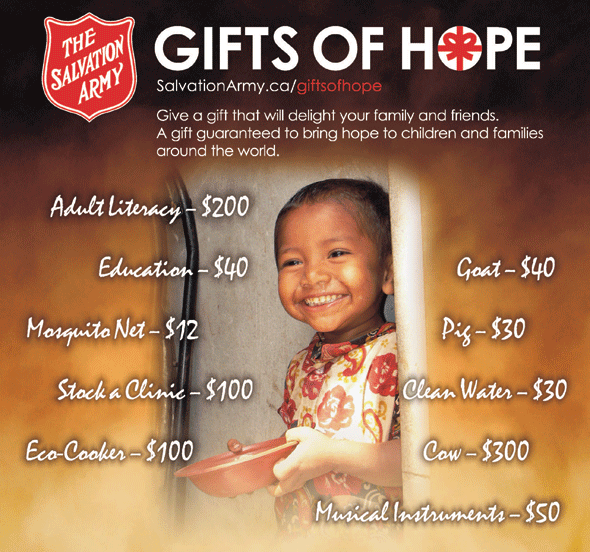 Since its inception, the Gifts of Hope program has offered Salvationists and friends of The Salvation Army the opportunity to give gifts that make a positive impact on families worldwide,” says Major Gillian Brown, associate director, THQ world missions. “We are encouraged by the positive response to this initiative and trust that it will continue to expand.”
Since its inception, the Gifts of Hope program has offered Salvationists and friends of The Salvation Army the opportunity to give gifts that make a positive impact on families worldwide,” says Major Gillian Brown, associate director, THQ world missions. “We are encouraged by the positive response to this initiative and trust that it will continue to expand.”
Thanks to generous donors, last year:
- 700 families received mosquito nets, protecting young children from malaria
- 400 goats were distributed, allowing 200 families in Bangladesh and Africa to earn an income
- 100 rural clinics in Tanzania and Liberia were stocked with basic medicine
- 750 children orphaned by HIV/AIDS in Tanzania and Malawi received uniforms and supplies to attend school
- 100 pigs were distributed to families in four rural villages in Bolivia, providing the families with a livelihood
- 300 families living next to Serengeti National Park in Tanzania benefited from a water-harvesting project
- four villages in Tanzania received cows, oxen and ploughs, improving their nutrition and enhancing their ability to produce crops and generate income
“This year, as you prepare for Christmas, birthdays or other celebrations, consider purchasing life-giving gifts—such as livestock, education, sanitation, mosquito nets and medical supplies—on behalf of friends and loved ones,” says Major Brown. “There are many options available.”

To place an order, visit SalvationArmy.ca/giftsofhope.
Gifts of Hope in Action
 Home-Based Care
Home-Based Care
In rural communities in Africa, it is not uncommon for children to die from preventable diseases. The Salvation Army in Malawi and Tanzania has developed a community-based approach, using teams of volunteers to visit families facing health challenges. The regular visits of the home-based care teams provide hope to rural villages far from larger medical facilities. HIV/AIDS patients are treated with dignity and compassion.
Gifts of Hope supported 100 clinics with basic first-aid and medical supplies through generous donations to the Stock a Clinic gift item. Your support increased the capacity of the home-based care teams to be more than a listening ear. Wounds were cleaned, medication provided and little bodies suffering from dysentery re-hydrated.
 The Eco-Worker
The Eco-Worker
The Eco-Cooker is a new addition to the Gifts of Hope program. Community teams from the Harry Williams Hospital in Bolivia witnessed the negative impact of deforestation on the surrounding villages. As land was stripped of trees and bush for firewood, the soil became increasingly unsuitable for crops. Families spent more time scrounging for fuel and their health deteriorated.
CEDESOL, a natural solar energy development company, has partnered with The Salvation Army to provide solar cookers that are affordable, easy to maintain and environmentally friendly. In addition, the community will receive funding to plant trees and begin the process of restoring the land.
 A Sip of Water
A Sip of Water
Rainfall in Serengeti National Park is among the lowest in Tanzania. There are no rivers running through the area, raising the competition between people and animals for the few stagnant ponds of water. Women and children spend hours walking to gather water. Attacks from lions, hyenas and wild monkeys mean families live in fear.
When geographical surveys indicated that a borehole would not be an option for this area of Tanzania, Gifts of Hope provided a unique response: water harvesting. Water professionals are working with the community to install large 20-litre tanks to store between 10,000 and 30,000 litres of harvested, clean water during the rainy season. People are receiving training and a water management committee will ensure that water tanks are well maintained. Completion of this project is expected in April 2010.









Leave a Comment